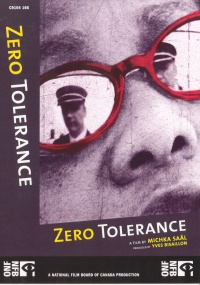| ________________
CM . . .
. Volume XI Number 21 . . . .June 24, 2005
One day, kibitzing with a number of students, I asked if any of them had ever been stopped by the police. There had been a great deal of news about racial profiling at that time. To my shock, each one said that they had. I knew these students as good kids who were not troublemakers in the school. Yet, outside of the school, they lived under a different reality. Michka Saäl's film, Zero Tolerance, looks at the relationship between various ethnic groups and the Montreal police force. While the attempt is made to provide balanced views, the film sees a problem. This is clear very early in the film where a youth is asked by the police to move on. He does, but not as quickly as the police wish, and suddenly he is being cuffed, frisked and driven off in a cruiser. Interviews with various ethnic groups show that this kind of behaviour on the part of the police is common and has generated much anger in the various communities. Having established one side of the issue, the film looks at racial problems within the police force. The issue of racism appears to be systemic as well. Visible minority police officers describe the difficulties they have encountered in their police careers: extended probation, forged requests for transfer, ethnic jokes and racial comments. One officer reports how once, on target shooting practice, a fellow officer decided to shoot at a magazine photo of a Black youth. That was years ago, but the Black officer cannot shake the memory. A community liaison is told that he is doing a good job except for two things: his accent and the fact that he is Jewish. The ethnic officers show that they have much to offer the police force, but, as minorities, they are fighting a difficult battle. The police are accused of running a police state. One young person states that it would be better to be attacked by a thug. At least then you could fight back. Against the police you can do nothing. This is after he was accused of trying to steal his own car. The police are given sensitivity training. The attendees are engaged in the sessions, and it would appear that this is a good start. However, during St. Jean Baptiste Day celebrations, the police remove their hats and are there as a friendly presence, mingling with the crowd and turning a blind eye to minor infractions. For the Caribbean festival, they wear helmets, riot gear, and some are mounted. No mingling in the crowd here, except as the film shows, to haul off a handcuffed man who is carried by three officers. The people resent the police presence and clearly, no bridges are being built. Knowing a problem is supposed to be the beginning of finding a solution. However, the overall message of the film is there is a problem, there has been a problem, for 13 "years as one person states, and there has been no change in the police profile in all that time." On that note, the film ends. This is a hard-hitting production with tough language. Each side is allowed to give its rationale, but overall the film sees a problem with policing in Montreal. The language is rough and the visuals disturbing, but Zero Tolerance is too powerful a film to overlook. Even with the subtitles, students will be engaged, especially if they connect themselves to the recipients of the police's actions. Zero Tolerance could be used in Law, Peer Mediation, Sociology and even Careers. It would serve to open dialogue and the eyes of teachers. The students I mentioned earlier were all Black, and their answer has disturbed me ever since. Highly Recommended. Frank Loreto is a teacher-librarian at St. Thomas Aquinas Secondary School in Brampton, ON.
To comment
on this title or this review, send mail to cm@umanitoba.ca.
Copyright © the Manitoba Library Association. Reproduction for personal
use is permitted only if this copyright notice is maintained. Any
other reproduction is prohibited without permission.
NEXT REVIEW |
TABLE OF CONTENTS FOR THIS ISSUE
- June 24, 2005.
AUTHORS |
TITLES |
MEDIA REVIEWS |
PROFILES |
BACK ISSUES |
SEARCH |
CMARCHIVE |
HOME |
